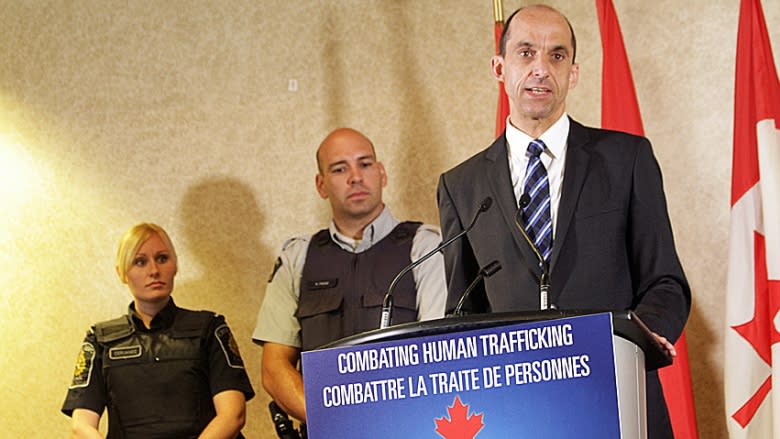20 Hamilton human trafficking ring members deported

Twenty members of what has been called the largest human trafficking ring in Canadian history are being sent back to Hungary, after the minister of public safety announced Tuesday in Hamilton the deportation of all but two convicted in the case.
The Domotor-Kolompar criminal organization brought as many as 19 victims from Hungary to the Hamilton area, forced them to work against their will from dawn to dusk, held them in basements and fed them food scraps.
"These individuals were part of the extended Domotor-Kolompar criminal ring, and were convicted under the Criminal Code of Canada of one of the most despicable crimes — human trafficking," said Public Safety Minister Steven Blaney at Tuesday morning's deportation announcement. "This flagrant abuse of persons in our immigration system demanded a strong response."
"We are sending a clear signal that there is no room in Canada for those who are committing the heinous and despicable crime of human trafficking."
The Canada Border Services Agency (CBSA) deported 20 people from May 2012 to May 2014 at the end of their prison sentences. The nine deportations publicly announced Tuesday are:
- Krisztina Csaszar.
- Ferenc Domotor Jr.
- Gizella Domotor.
- Jozsef Domotor.
- Ferenc Karadi.
- Attila Kolompar.
- Gizella Kolompar.
- Gyozo Papai.
- Janos Szanto.
Victim of trafficking speaks up
In April 2012, the kingpin of the human trafficking ring, Fernec Domotor Sr., was sentenced to nine years after he pleaded guilty to being part of a criminal organization, conspiracy to traffic in human beings and coercing victims to mislead immigration authorities.
Officials at Tuesday's news conference confirmed he is still in custody. The government did not release a full list of deportees, but said that 20 of the 22 members convicted in the case are being removed from Canada. "The decision to disclose these nine identities is not taken lightly," said Goran Vragovic, the CBSA regional director general for the Greater Toronto Area. It was in the public interest to let people know members of this crime ring were no longer in Canada, he said.
Domotor's brother Gyula Domotor was not deported because he is the only member of the criminal organization with Canadian citizenship.
The ring targeted young men who were promised jobs and an easy life. Once in Canada, their passports were seized, and they were made to apply for refugee status as well as welfare. Their captors threatened violence against their families back home if they left.
When one person came forward to authorities, it ultimately toppled the entire ring.
Most immigrants 'play by the rules'
Tomas Miko went to the RCMP, ultimately leading to the 2010 bust of the Domotor gang under the code name Project OPAPA. The victims have since resettled throughout southern Ontario, officials said Tuesday.
"This was completely demoralizing and humiliating for them," said lead RCMP investigator Const. Lepa Jankovic. "Some of them were treated like dogs."
The victims were brought very little food, she said, and in some instances, they were getting table scraps with bites taken out of them. "It was very difficult," she said. "To know people were being kept for labour basically as slaves was just unheard of."
The minister acknowledged that while this was clearly a flagrant abuse of Canada's immigration system, the vast majority of people coming to Canada "play by the rules" and contribute positively to their communities.
"We know that Canadians by and large support a generous and fair immigration system," Blaney said. "But when Canadians see people abusing that system, it offends their sense of fairness and their respect for the rule of law."


